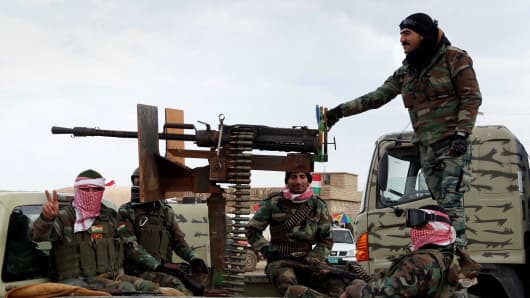Kurdish peshmerga recently opened a corridor to Mt. Sinjar, rescuing 10,000 Yazidis under siege by the Islamic State. A battle looms to liberate Mosul, Iraq's second largest city. Arab Sunnis and tribes from the Nineveh plains must take the lead.
Atheel al-Nujaifi, Governor of Nineveh Province, was one of the last to leave Mosul after ISIS stormed the city on June 10, 2014. During our recent meeting in Erbil, Nujaifi described his strategy for engaging Arab Sunnis and tribal sheikhs to defeat ISIS.
Nujaifi envisions a major role for Nineveh's exiled police and security services. Tribal sheikhs and Arabs displaced by ISIS would also join the battle. "As soon as we take some villages," maintains Nujaifi, "people inside Mosul will join us." Up to 1 million Arabs displaced by the conflict "have no aim in life but returning to their homes."
Read MoreHow the US and Iran could become BFFs
Sunni tribal leaders are reluctant to publicly pledge support. They are worried about reprisals against their brethren living under ISIS control. Still, "Most tribes oppose ISIS," insists Nujaifi."They have no loyalty to ISIS." If the Arab tribes are paid, I believe they will fight.
Many tribal sheikhs welcomed Islamic State fighters when they first arrived. Iraq's Arab Sunni minority, which enjoyed favor under Saddam Hussein, deeply resented the polarizing politics of Prime Minister Nouri al-Maliki. Disenfranchised and marginalized, they saw ISIS as a liberation force.
Today, they chafe under the Islamic State's strict interpretation of Islam. Nujaifi insists they are ready to turn on ISIS.
Establishing a National Guard is the core of Nujaifi's plan. The National Guard would be comprised of Nineveh's security services, who fled ISIS's advance.
While endorsing legislation establishing the National Guard, he wants Shiite militias to be disbanded. All security forces should be established by law.
Read MoreISIS airstrikes: A look at America's Arab allies
Shiite militias arose after Ayatollah Ali al-Sistani issued a religious edict ("fatwa") calling for Shiites to protect Iraq's Shia shrines from the Islamic State. Many appear to have links to Iran's Revolutionary Guard Council. They operate outside Baghdad's control. In the wake of Iraq's sectarian civil war, some have committed crimes and atrocities against Sunnis.
Nujaifi wants help from the United States. "We need weapons, training, and air strikes," says Nujaifi. However, Washington is reluctant. It only offers training and equipment through Iraq's central government.
Fighters must be carefully vetted before weapons are provided. After the Iraqi Army's Mosul garrison collapsed in June, local police fled abandoning weapons to Islamic State forces.
Mosul is a city of more than 1 million people. US air strikes will have limited impact. Expect a bloody battle with fierce street-to-street fighting.
Read MoreOp-ed: The one person who can bail out Putin
The Iraqi Army seems to lack motivation and capacity. Maliki gutted the army of professional soldiers, replacing them with Shiite cronies. It will take time before the armed forces are ready for combat.
Iraqi Kurds also seem reluctant to join the battle; The Islamic State is their enemy but Mosul is not their fight. Though the Kurds provided sanctuary to Arabs fleeing ISIS, there is a history of animosity between Kurds and Arab Sunnis.
Arab Sunnis and Arab tribes must bear the brunt. Kurds and other Iraqis may participate in a supporting role, but only after Sunnis show unity and resolve.
Commentary by David L. Phillips, director of the Program on Peace-building and Human Rights at Columbia University's Institute for the Study of Human Rights. He served as a senior adviser and foreign- affairs experts to the State Department. His new book is "The Kurdish Spring: A New Map for the Middle East."



